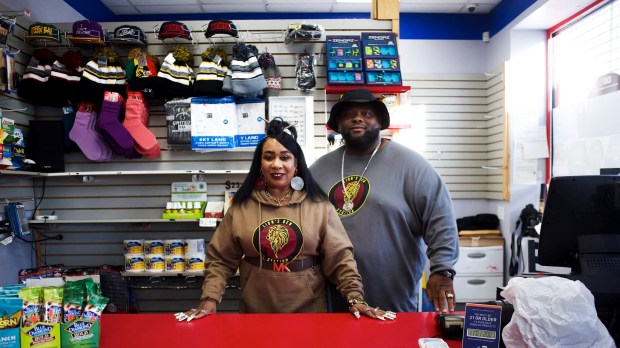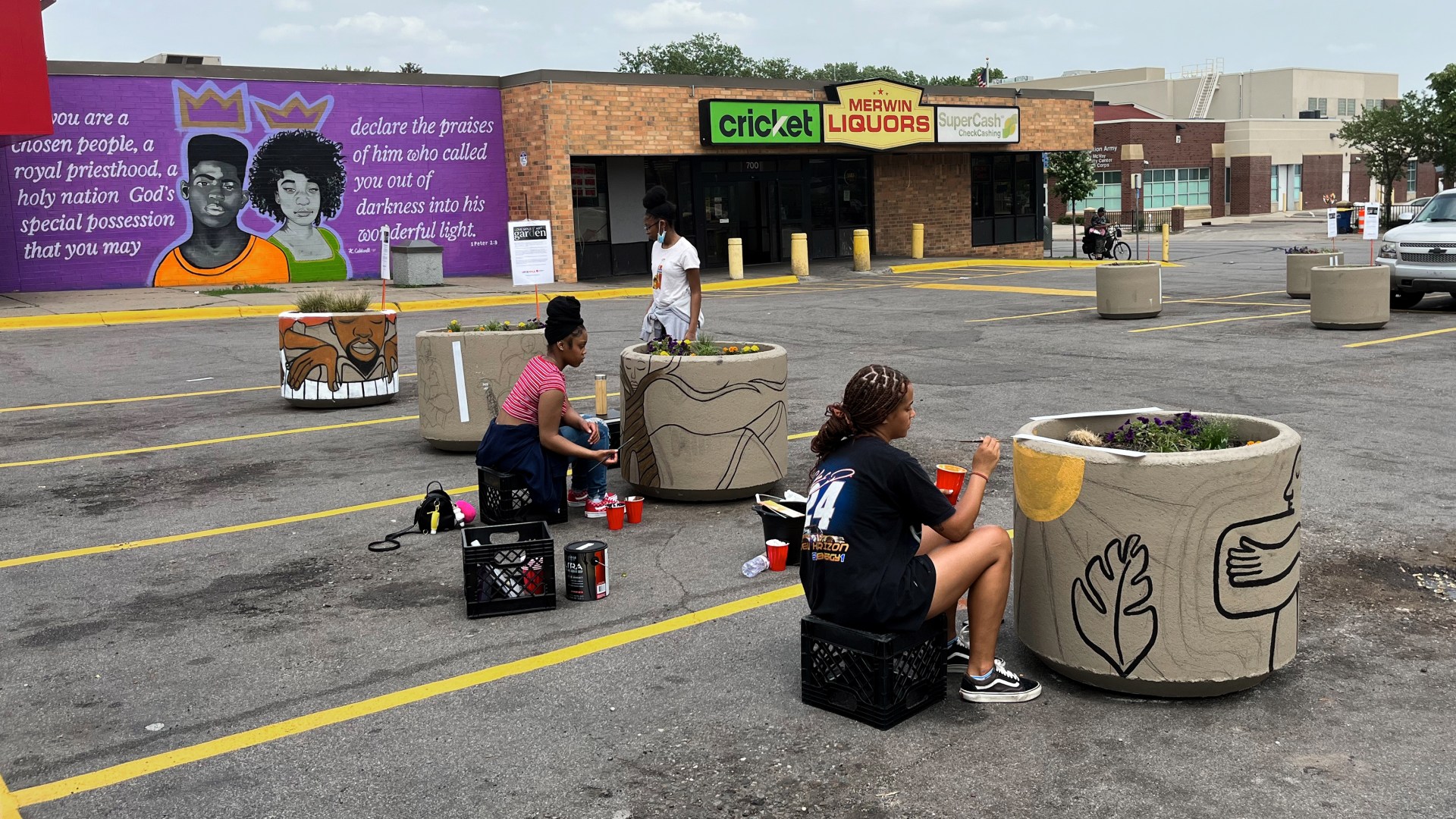Most people don’t take real estate advice from a drug dealer behind a gas station in North Minneapolis. But Larry Cook, bishop of Real Believers Faith Center, is not most people.
About a year ago he confronted some young men selling narcotics in the alley between his church and the corner store that seemed to do more business in illegal goods than snacks or fuel. Things got heated pretty quickly. Voices were raised.
“The owner don’t care about it,” one of the young man yelled, as Cook and his wife, Sharon, recall the confrontation. “If you want to do something about it, you need to buy the gas station.”
“I will,” Cook responded. “I absolutely will.”
What the man selling drugs didn’t know is that Cook had actually been thinking about buying the store for the past 25 years. He believed he was being called and when the time was right, God would expand his ministry to include this sore spot in the neighborhood, the store at the corner of a busy intersection.
This fall, the store came up for sale, and Cook and his wife put everything they had toward the purchase of the $3 million property. They’ve now reopened it under the name the Lion’s Den, a testament to faith surrounded by danger and their belief that even urban blight can be redeemed.
“This is what Jesus would do,” Sharon Cook told CT. “If he was walking in 2023, he would buy this gas station. He would feed the hungry. He would lend a helping hand to the elderly the same way we’re doing.”
North Minneapolis has struggled for a long time. In the 1950s, there was a thriving African American community, with lots of families, churches, and Black-owned businesses. Then there was a wave of white flight, followed by racial unrest that scared away financial investors, and the construction of an interstate that cut Near North off from downtown. Today, the area is marked by instability and poverty.
“There have been chronic patterns of violence over many years, but in the last three years … it’s been exacerbated by the fallout effect after the murder of George Floyd and everything that cascaded down from that,” said Carl Nelson, president of Transform Minnesota, an evangelical organization that brings churches together to wrestle with social issues.
Crime has increased as policing has declined in the area, resulting in a lawsuit over “minimum force levels.” Last year, the Minnesota Supreme Court sided with eight northside residents and ordered the city to hire more police officers.
Several key businesses that serve the area have also decided to leave. Aldi, one of the few grocery stores that is easily accessible to people without cars, closed last weekend. Walgreens is closing too, citing “the dynamics of the local market.”
Nelson, who has lived in the area for 25 years and drives past Real Believers Faith Center almost every day, said some of the remaining corner stores and gas stations have become magnets for crime. When they’re run by people who are not personally invested in the community, nothing is done about the drugs, robbery, and shootings outside.
“You look at the city and the landscape—the social fabric of the city—and it’s just dismaying,” he said. “In some cases, the business owners are making a lot of money. They put up bulletproof glass for their registers to sit behind, and they just put up with the danger and continue making their money.”
One force that’s been able to stand against the violence has been local churches. Last May, a group of ministers led by New Missionary Baptist pastor Jerry McAfee occupied street corners as part of a project McAfee called 21 Days of Peace.
“In those places where they were able to be, they disrupted and changed the cycle of violence,” Nelson said.
Buying a corner store could have the same effect, according to Nelson.
“It’s a creative and direct way for a church to say we’re going to do something very tangible in our community,” he said, “try and affect the safety and livability of the streets right outside our parking lot.”
A few blocks away from the Lion’s Den, another church is working to transform another corner of North Minneapolis. At the intersection of West Broadway and Lyndale Avenue is a gas station known locally as “murder station.” Leaders at Sanctuary Covenant Church, located at that same intersection, have petitioned the city to take action to reduce crime in the area. Last summer, the front door of the church was hit by bullets 14 times.
“We knew as we built our church that we were planting in a place that has seen decades of trauma and violence,” said Andrea Lee, church director of operations. “It is our calling to be right where we are.”
Since Sanctuary was planted 20 years ago, the church has launched a resource center that houses a food pantry and two nonprofits helping young people and people with addictions. Recently, the congregation decided it would try to tackle the ugliness in the corner parking lot.
They added speed bumps and concrete planters as well as more than 100 feet of raised garden beds. Sanctuary hired young artists from the neighborhood to paint the planters and care for the gardens. The cumulative effect is an area less conducive to crime and a message to the neighborhood that someone cares about that parking lot and that the church believes in the possibility of transformation.
“The image of these youth working in the lot, making it beautiful was so healing for our northside community,” Lee said. “We tried to stand against what happens in that lot every year during warmer weather by encouraging art, gardens, and positive interactions with people.”
All those working to make the city better, know that change takes time, however.
If there was any idea that transforming the property and the neighborhood around Real Believers Faith Center (RBFC) would be completed with the purchase, Sharon Cook said that ended the first day, when she witnessed another drug deal taking place in broad daylight.
The church took heart by recalling God’s long faithfulness. When Larry Cook planted RBFC in 1998, there were just eight people in the pews some Sundays. There was no financial backing from a denomination or church-planting network, so the congregation had to operate without a safety net.
“There was no savings and no money and no credit,” Cook said. “It was a dog fight every single day.”
Amid the struggles, the church saw new life and real transformation. People who were once addicted found freedom. People who were violent found another way to live. The church now averages around 200 people on Sundays and has a membership of more than 500.
“More than half of the congregation of my church was unchurched and comes from selling drugs and being on the streets and using drugs,” he said. “There’s no way I can look at people who haven’t made that transition yet and say there is no value.”
Cook reminds people, too, that even buying the corner store once seemed impossible. He remembers walking out of church one Wednesday night with his congregation and telling them of his vision that one day he would buy that property.
“I told the people that we were going to lay hands on this property around us because God is going to give us the land,” he said.
“Bishop, it’s going to be expensive,” people told him.
But he just said, “God’s got a way of making it happen for us.”
On November 1, Cook signed the papers, and then he went and laid hands on the property again, giving thanks to God. The corner store is set up as an independent entity, but the church sees it as a place for ministry.
As Larry Cook goes from the church to the store and the store to the church, he proclaims with his life that change is possible. He knows it is, because it’s already happening.
“It’s like we’re having an evangelism day every day now,” Larry said. “Ministry just walks up to me. I’m able to minister to people, lay hands on people, pray for the sick, feed the hungry. It’s a nonstop effort.”
Sometimes Cook even sees the young man who told him to buy the store. He stopped in to buy snacks shortly after the purchase.
“You all really bought it,” he said. “You know what, I can’t even be mad. Respect.”










